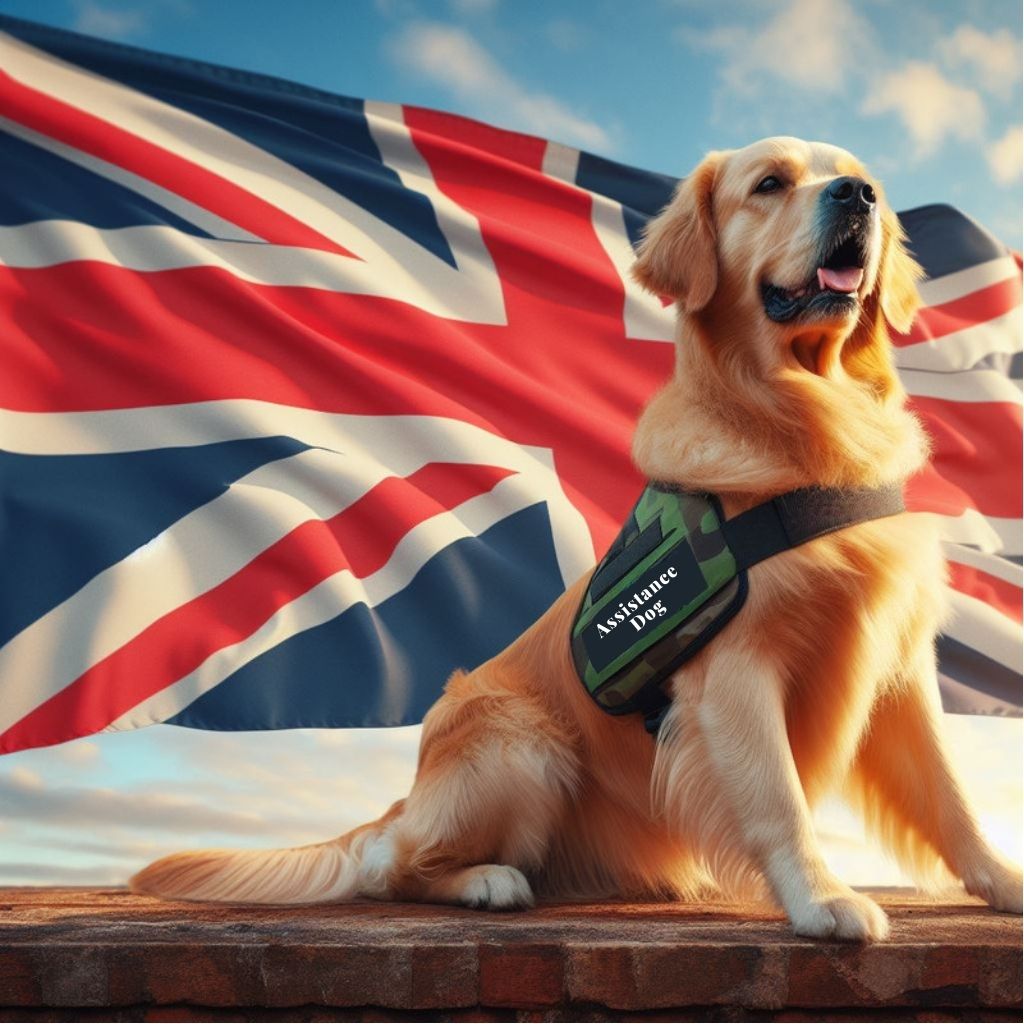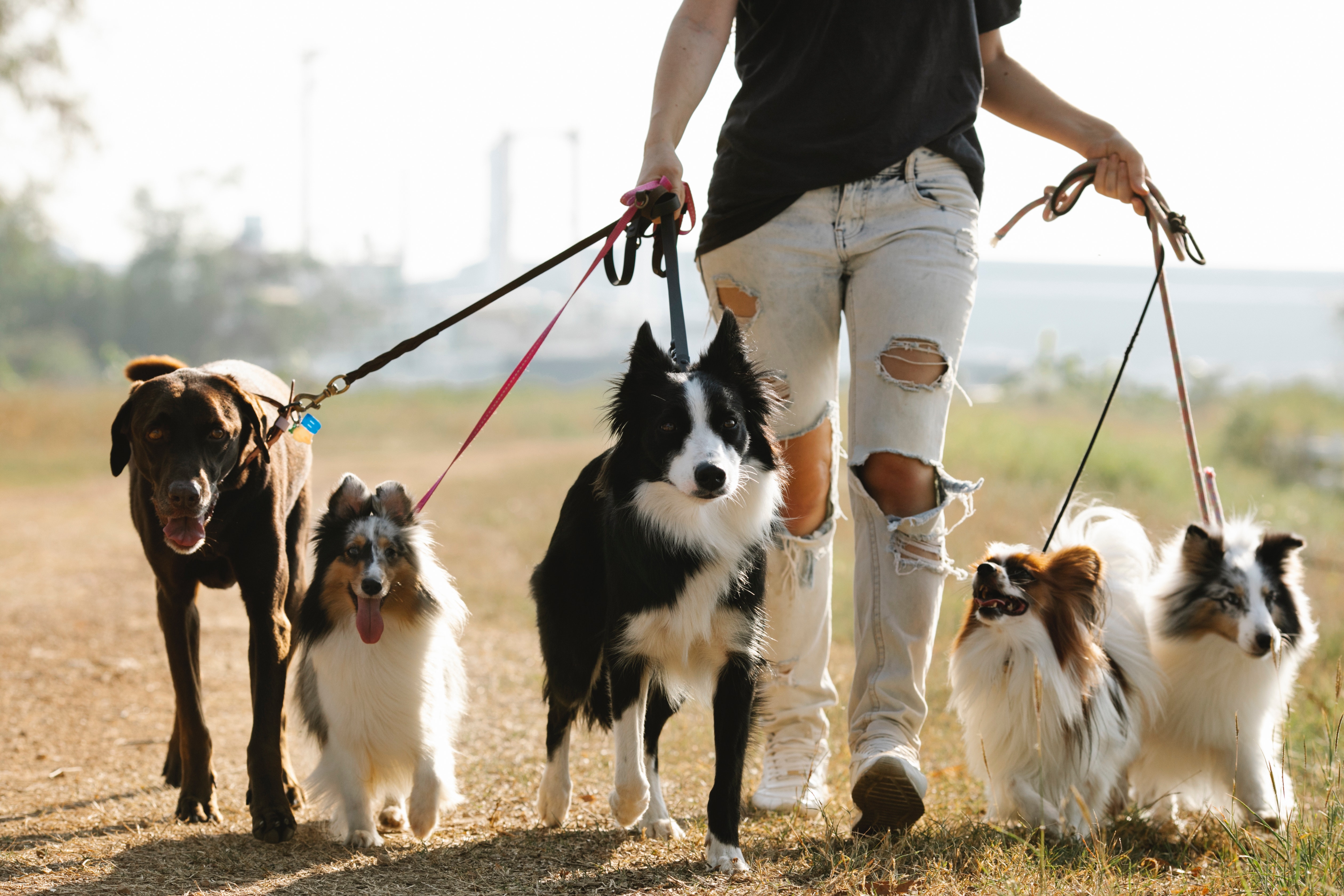- How Many People in the UK Rely on the Support of Assistance Dogs?
- Assistance Dog Laws in the UK We Need to Consider
- The Dangerous Dogs Act 1991 Explained
- The Equality Act 2010 Explained
- The EHRC and Their Policy on Assistance Dogs
- The Disability Discrimination Act 1995 Explained
- Disability Rights Commission (DRC) in Northern Ireland
- What Can I Do if I Am Being Discriminated Against Due to My Owner-Trained Assistance Dog?

Service Dogs are specially trained canines that assist people with various disabilities. The term “service dog” is mostly used in North America and Australia. In contrast, these animals in the UK and most European countries, in general, are usually referred to as “assistance dogs” or “assistance animals”. Both terms are interchangeable, but in some cases, the term “service dog” can refer to a working canine trained to detect drugs at a border control unit, detect bombs, or work as a police dog and assist with arrests.
When embarking on a journey to train your pet dog as a service dog yourself, and benefit from programs like ours, it is essential to be familiar with the relevant legal framework. While some countries recognize self-trained service animals, others have stricter requirements.
We will try to explain the service/assistance dog laws in the United Kingdom so you can understand your rights as an owner-trained assistance dog team when using public spaces and services. If you want to know more about professional service dog training in general we cover this topic in our article: Is Service Dog Training Free?
How Many People in the UK Rely on the Support of Assistance Dogs?
The latest estimates from the Department for Work and Pensions’ Family Resources Survey for the 2021/22 financial year indicate that 16.0 million people in Britain have a disability. About ~7,000 people in the United Kingdom rely on an assistance dog according to the University of Warwick and information posted by the Assistance Dogs UK (ADUK). The majority of them are guide dogs but there are also mobility aid dogs (useful to wheelchair users), hearing aid dogs, psychiatric assistance dogs, as well as medical detection dogs (useful to people with diabetes, seizures, and cardiac issues).
Assistance Dog Laws in the UK We Need to Consider
First, we need to acknowledge the fact that the United Kingdom consists of four countries (England, Wales, Scotland, and Northern Ireland) which are granted different degrees of autonomy. Therefore, we need to be aware of the following laws:
Equality Act 2010 which is enforced in England, Wales, and Scotland.
Disability Discrimination Act 1995 which is enforced in Northern Ireland.
Dangerous Dogs Act 1991 which is enforced across all member countries.
These laws guarantee full public access rights to assistance dog users and handlers of assistance animals. This means you can visit any business that is open to the public as well as any medical facility such as a hospital, a clinic, a nursing home, or a retirement home. You can visit restaurants, use public transport, use taxi services, and Uber (and similar ride-sharing services). You are granted access to housing with your assistance dog and no landlord can refuse you housing due to your assistance dog. You can go to work with your assistance dog as long as the dog is not interfering with the function of the office and does not disturb the proceedings.
There are only a few limitations when it comes to public access - you can not go into facilities where food is prepared or areas where hygiene is of crucial importance. For example, you can go to a restaurant, but you can not go into the kitchen area; you can visit a clinic but you can't access the areas meant for testing and conducting research; you can go to the zoo park but you can not visit some areas where your dog may be perceived as prey or predator and disturb the exhibited animals.
The Dangerous Dogs Act 1991 Explained
Let’s start with the Dangerous Dogs Act which places a ban on certain dog breeds that the UK government considers unsafe and too aggressive. At the time of writing, the ban makes it illegal to own, sell, breed, give away, or abandon one of these types of dogs: Pitbull Terrier; Japanese Tosa; Dogo Argentino; Fila Brasilerio; American XL Bully.
Please, keep in mind that dogs who are perceived by the public, your local police officers, and community dog wardens to appear dangerous could be taken from you. Dog owners can apply for a “Certificate of Exemption” which is issued by the Department for Environment, Food & Rural Affairs. If you own a dog of a banned breed you should first contact your local police office and receive further instructions. Exempted dogs are allowed to return home under certain conditions, including that they are neutered, kept on a lead, and muzzled in a public place. You can send an email to the Companion Animal Welfare Team to help you acquire a certificate of exemption: [email protected]
Dogs who have a Certificate of Exemption can be assistance dogs but the public may not welcome them warmly. You may face unfriendly treatment when visiting hotels on vacation, local businesses, and using public transportation.
The Equality Act 2010 Explained
The Equality Act 2010 is a piece of legislation in the United Kingdom that aims to protect individuals from discrimination and promote equality across various areas, including employment, education, housing, and the provision of goods and services.
It brings together and replaces previous anti-discrimination laws, such as the Race Relations Act 1976 and the Sex Discrimination Act 1975, into a single Act. The Equality Act protects people from discrimination based on nine protected characteristics: age, disability, gender reassignment, marriage and civil partnership, pregnancy and maternity, race, religion or belief, sex, and sexual orientation.
The Act makes it unlawful to discriminate, harass, or victimize someone based on these protected characteristics. It also places duties on public bodies, employers, and service providers to promote equality and eliminate discrimination. Additionally, it provides a framework for addressing inequality and promoting diversity and inclusion in society.
The Act directly references assistance dogs in Part 12 “Disabled Persons: transport”, Chapter 1, Section 173. The definition of “assistance dog” is as follows:
“(a) a dog which has been trained to guide a blind person;
(b) a dog which has been trained to assist a deaf person;
(c) a dog which has been trained by a prescribed charity to assist a disabled person who has a disability that consists of epilepsy or otherwise affects the person’s mobility, manual dexterity, physical co-ordination or ability to lift, carry, or otherwise move everyday objects;
(d) a dog of a prescribed category which has been trained to assist a disabled person who has a disability (other than one falling within paragraph (c)) of a prescribed kind;”
The UK assistance dogs policy is enforced by the Equality and Human Rights Commission (EHRC). This government body is responsible for promoting and enforcing equality and human rights laws. Their rulings apply to cases in England, Wales and Scotland.
Please, note that there is a separate commission for Scotland. The Scottish Human Rights Commission is an independent public body, accountable to the people of Scotland through the Scottish Parliament. The Commission has a general duty to promote awareness, understanding, and respect for all human rights
The EHRC and Their Policy on Assistance Dogs
We would like to share a resource from the EHRC that explains their policy in a clear manner. As of March 11th, 2024, the EHRC posted the following:
"Some, but not all assistance dog users, will carry an ID book giving information about the assistance dog and the training organisation together with other useful information. Again, this is not a legal requirement and assistance dog users should not be refused a service simply because they do not possess an ID book.
Assistance dogs can also be owner-trained. The owner selects their own dog to fit their own requirements."
This is available under the section "What is an assistance dog?" on their page "Assistance dogs: A guide for all businesses" where you can find clarification on the treatment of assistance dogs, the obligations and rights of assistance dog teams as well as advice for business owners. Additionally, you can access the PDF titled "Assistance dogs: a guide for all businesses" at this address: https://www.equalityhumanrights.com/sites/default/files/assistance-dogs-a-guide-for-all-businesses.pdf
Please note that the EHRC updated its website in November 2023, and as a result, the direct link provided above may no longer work. We saved a copy of the file which you can see here. The leaflet may be moved to a new page as the EHRC website is being continually improved and updated.
The same information is available on the "Ability Shetland" website and their PDF document (page 4) about assistance dogs. This is further supported and acknowledged by the information resources on the Assistance Dogs UK website. It is not a legal requirement for Assistance Dog users to provide an ID card or “proof” of training. There is no legal requirement for assistance dogs to wear a vest either, but we strongly encourage assistance/service dog handlers and users to make their highly-trained canine partner easily recognizable in the interest of their comfortable public access.
For information, advice, and support on discrimination and human rights issues, the EHRC directs citizens to the Equality Advisory Support Service (EASS). Their phone number is — 0808 800 0082 and you can message them using an online form. The EASS is commissioned by the UK government and works with other advice organizations. The EHRC is unable to respond to individual inquiries and you will be forwarded to the EASS, please keep that in mind.
The Disability Discrimination Act 1995 Explained
The Disability Discrimination Act 1995 (DDA) in Northern Ireland is a piece of legislation aimed at promoting equality and protecting the rights of disabled individuals. It aims to tackle discrimination against people with disabilities in various areas of life, including employment, education, and access to goods and services.
The DDA makes it unlawful to discriminate against disabled individuals in employment, education, housing as well as the provision of goods, facilities, and services. It requires employers, service providers, and educational institutions to make reasonable adjustments to accommodate the needs of disabled people, such as providing wheelchair access, adjusting work hours, and granting access to assistance dog teams.
Under the Disability Discrimination Act 1995, "assistance dogs" are defined as dogs that have been trained to assist individuals with disabilities. These dogs are specially trained to perform tasks that help their owners overcome barriers and navigate their daily lives more independently. The DDA adopts the same definition as the Equality Act for “assistance dogs” as evident in Part 5 "Public Transport", "Taxis", Section 37A.
Disability Rights Commission (DRC) in Northern Ireland
The Act also establishes the Disability Rights Commission (DRC) in Northern Ireland, which is responsible for promoting equality for disabled people, providing information and advice, and enforcing the provisions of the DDA. If you require legal advice you can reach out to the DRC. You can call the DRC using this number — 028 90 500 600. You can also email them at: [email protected]
What Can I Do if I Am Being Discriminated Against Due to My Owner-Trained Assistance Dog?
Should you feel that you are being discriminated against, please reach out to the government bodies mentioned above. Their response time via email can range from 2 to 5 business days and their work hours are typically between 9 am to 7 pm, Monday to Friday. They also work from 10 am to 2 pm on Saturday. Please, keep in mind that you are not going to receive a reply on Sundays and Bank Holidays.
If you believe you have experienced discrimination, you will need to submit an official complaint or application and specify your protected characteristic. These characteristics include age, disability (mental and/or physical), gender reassignment, marriage and civil partnership, pregnancy and maternity, race, religion or belief, sex, and sexual orientation. You will be required to provide written details about the incident, including what occurred, where, and when.
If you have relevant photo or video evidence to support your claim, you will have the opportunity to upload them for review. You can do this either through an online submission form or via email. For instructions on how to proceed with submitting evidence, please reach out to the EAAS or the DRC.












